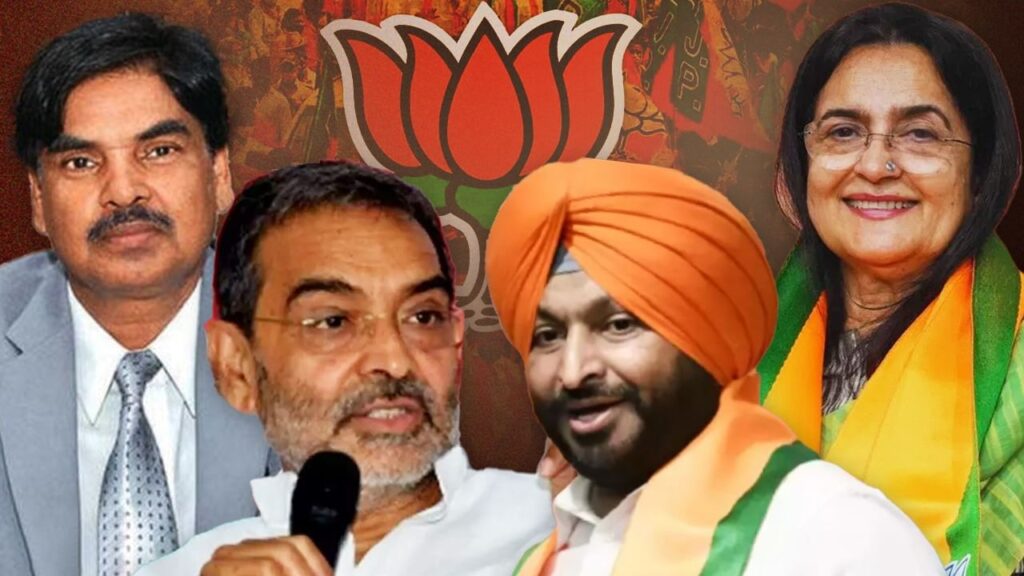Introduction
The final day for nominations for 12 Rajya Sabha seats across 9 states in India is today, and the Bharatiya Janata Party (BJP) has already announced its candidates for 9 of these seats. While the BJP seems to be strategizing politically through the Rajya Sabha elections, it has notably favored turncoats and leaders from other parties over its own members. This development has left many aspiring candidates from states like Bihar, Rajasthan, and Haryana disappointed, as the party has chosen to nominate leaders who have recently switched allegiance rather than its long-standing members. This political maneuvering is expected to yield multiple advantages for the BJP in various regions.
BJP’s Rajya Sabha Candidates
For the upcoming Rajya Sabha elections, here are the candidates announced by the BJP:
| State | Candidate |
|---|---|
| Madhya Pradesh | George Kurian |
| Assam | Mission Ranjan Das, Rameshwar Teli |
| Bihar | Manan Kumar Mishra |
| Haryana | Kiran Chaudhary |
| Maharashtra | Dhairyashil Patil |
| Odisha | Mamta Mohanta |
| Rajasthan | Sardar Ravneet Singh Bittu |
| Tripura | Rajiv Bhattacharya |
| Bihar (additional seat) | Upendra Kushwaha |
Strategizing With Turncoats
In a surprising move, the BJP has opted to nominate leaders from opposing parties who have recently switched sides. For instance, Kiran Chaudhary from Haryana, who left Congress after the Lok Sabha elections, has been selected as a Rajya Sabha candidate. Similarly, Ravneet Singh Bittu, who switched from Congress to BJP during the Lok Sabha elections, is being sent to the Rajya Sabha from Rajasthan. These choices emphasize the BJP’s strategy of consolidating its influence by prioritizing individuals who can potentially win over specific voter demographics, rather than its traditional party members.
Impact on Aspiring Candidates
With this strategy in place, many BJP leaders who were hopeful of being nominated to the Rajya Sabha are left disappointed. The vacancy in Madhya Pradesh arose from Jyotiraditya Scindia’s resignation, which led to speculation around candidates like KP Yadav and Narottam Mishra. However, the announcement of George Kurian’s nomination dashed their hopes, as the party aimed to strengthen its position among the Christian community in Kerala.
Political Rationale Behind Candidate Selection
The BJP’s choices reflect a calculated approach to electoral politics. In Bihar, Manan Kumar Mishra and Upendra Kushwaha have been selected, targeting both the upper castes and the OBC votes ahead of the upcoming assembly elections. The party is keen on messaging its commitment to diverse representation while simultaneously trying to consolidate its voter base.
Regional Dynamics and Community Outreach
In Haryana, the nomination of Kiran Chaudhary is aimed at catering to the Jat vote bank, a crucial demographic for the BJP in this region. The previous candidate, Deepender Singh Hooda, moved to the Lok Sabha, leaving this seat open. By selecting a prominent member of the Jat community, BJP aims to solidify their standing among this voter base.
Conclusion
With the Rajya Sabha elections approaching, the BJP is demonstrating its willingness to adapt its strategies effectively to meet emerging challenges. By leaning towards turncoats from rival parties, the BJP is not just filling seats but is also strategically positioning itself to maximize its electoral gains across various states. This approach may signal a transformative phase in Indian politics, where traditional party loyalties could be overshadowed by strategic alliances designed for electoral success.

